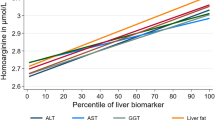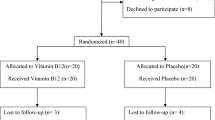Abstract
The purpose of this study was to study the effects of serum folate and plasma pyridoxal 5′-phosphate (PLP) on plasma homocysteine, oxidative stress and antioxidant capacities in 44 hepatocellular carcinoma (HCC) patients and 56 healthy controls. The responses of folate, vitamin B-6, homocysteine, oxidative stress and antioxidant enzyme activities in HCC patients before and after tumor resection were also determined. Patients with HCC before tumor resection had significantly lower folate, PLP, homocysteine, glutathione peroxidase and superoxide dismutase levels, but higher malondialdehyde, total antioxidant capacity and glutathione S-transferase activity when compared with healthy controls. Oxidative stress was significantly decreased to a level similar to that of healthy controls after tumor resection in the HCC group. There were no associations of folate and PLP with plasma homocysteine, indicators of oxidative stress and antioxidant capacities. Serum folate and plasma PLP were not significant factors affecting plasma homocysteine, oxidative stress and antioxidant capacities in patients with HCC.
This is a preview of subscription content, access via your institution
Access options
Subscribe to this journal
Receive 12 print issues and online access
$259.00 per year
only $21.58 per issue
Buy this article
- Purchase on Springer Link
- Instant access to full article PDF
Prices may be subject to local taxes which are calculated during checkout
Similar content being viewed by others
References
Butler LM, Arning E, Wang R, Bottiglieri T, Govindarajan S, Gao YT et al. Prediagnostic levels of serum one-carbon metabolites and risk of hepatocellular carcinoma. Cancer Epidemiol Biomarkers Prev 2013; 22: 1884–1893.
Pogribny IP, James SJ, Beland FA . Molecular alterations in hepatocarcinogenesis induced by dietary methyl deficiency. Mol Nutr Food Res 2012; 56: 116–125.
Food and Nutrition Board—Institute of Medicine Dietary Reference Intakes. Thiamin, Riboflavin, Niacin, Vitamin B-6, Folate, Vitamin B-12, Pantothenic acid, Biotin, and Choline. National Academy Press: Washington, DC, USA, 1998.
Selhub J, Jacques PF, Wilson PW, Rush D, Rosenberg IH . Vitamin status and intake as primary determinants of homocysteinemia in an elderly population. JAMA 1993; 270: 2693–2698.
Ventura P, Rosa MC, Abbati G, Marchini S, Grandone E, Vergura P et al. Hyperhomocysteinaemia in chronic liver diseases: role of stage disease, vitamin status and methylenetetrahydrofolate reductase genetics. Liver Int 2005; 25: 49–56.
Culafic DM, Markovic ML, Obrenovic RZ, Mijaa DD . Plasma homocysteine levels in patients with liver cirrhosis. Vojnosanit Pregl 2013; 70: 57–60.
van Guldener C . Why is homocysteine elevated in renal failure and what can be expected from homocysteine-lowering? Nephrol Dial Transplant 2006; 21: 1161–1166.
Hultberg M, Hultberg B . Oxidative stress decreases extracellular homocysteine concentration in human hepatoma (HepG2) cell cultures. Chemico-Biol Interact 2007; 165: 54–58.
Hoffman M . Hypothesis: hyperhomocysteinemia is an indicator of oxidant stress. Med Hypotheses 2011; 77: 1088–1093.
Keles M, Al B, Gumustekin K, Demircan B, Ozbey I, Akyuz M et al. Antioxidant status and lipid peroxidation in kidney tissue of rats fed with vitamin B6-deficient diet. Renal Fail 2010; 32: 618–622.
Acknowledgements
This study was partially supported by a grant from Taichung Veterans General Hospital, Taiwan (TCVGH-1034602B) and partially supported by a grant from the Ministry of Science and Technology, Taiwan (NSC 101-2320-B-040-016-MY3). We thank the nurses and technicians at Taichung Veterans General Hospital for providing expert assistance with the collection and analysis of the blood samples.
Author contributions
S-BC was responsible for screening of subjects, hematological measurements and statistical analyses. H-TL was responsible for the screening of subjects and interpretation of the results. P-TL was responsible for interpretation of the results. C-YL was responsible for the screening of subjects. Y-CH was responsible for the development of intellectual content and the study design, interpretation of the results and manuscript drafting.
Author information
Authors and Affiliations
Corresponding author
Ethics declarations
Competing interests
The authors declare no conflict of interest.
Rights and permissions
About this article
Cite this article
Cheng, SB., Liu, HT., Lin, PT. et al. Folate and vitamin B-6 status are not associated with homocysteine, oxidative stress and antioxidant capacities in patients with hepatocellular carcinoma. Eur J Clin Nutr 70, 855–858 (2016). https://doi.org/10.1038/ejcn.2015.222
Received:
Revised:
Accepted:
Published:
Issue Date:
DOI: https://doi.org/10.1038/ejcn.2015.222



